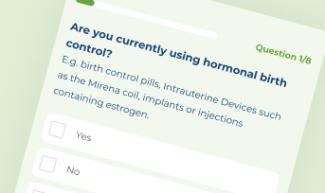
Perimenopause means “around menopause” and is when your menstrual cycles and hormone levels start to change as you transition to menopause. Your cycles may get shorter or more irregular, and you may experience symptoms like night sweats or headaches due to the change in hormones1. Perimenopause isn’t always a walk in the park, but there are good options to help ease the symptoms.
Read on to learn more about perimenopause, why it happens, its symptoms, and more.
Why does perimenopause happen?
Menopause (and hence, perimenopause) is a natural part of aging for all women. As your body makes the transition to menopause, hormone levels begin to change. Your ovaries produce declining amounts of estrogen and progesterone, and you’ll release fewer and fewer eggs until you stop ovulating altogether and your periods stop. Fun fact, in the 18th and 19th centuries, perimenopause was called “the dodge” or “dodging” because women were dodging between periods2.
These hormonal changes can make your periods3:
- longer
- shorter
- heavier
- lighter
- more frequent
- less frequent
Essentially, if you find your body “dodging” a relatively regular period, it could be one of the first big signs of perimenopause, especially if you’ve had regular periods up until now.
Symptoms of perimenopause
Other than changes to your menstrual cycle, you may also notice some of the following symptoms during perimenopause3,4:
Vasomotor symptoms - these are symptoms that occur due to the constriction or dilation of blood vessels, like:
- Hot flashes - sudden and short bursts of heat usually occurring in the face, neck, and chest, which can also make your skin red and sweaty
- Night sweats - the only real difference here is that night sweats are hot flashes that happen at night, which can be a drag as you sweat so much your night clothes and bedding can get soaking wet
- Palpitations - you may notice your heartbeat sometimes flutters or becomes too hard or too fast
- Sleeping difficulties - you may be kept awake by hot flashes, night sweats, or just have trouble sleeping, which could cause you to feel tired and irritable during the day
Sexual symptoms:
- Vaginal dryness - this may also be accompanied by pain, itching, or discomfort during sex
- Reduced sex drive
Psychological symptoms:
- Anxiety
- Mood changes
Cognitive symptoms:
- Memory problems
- Concentration problems
- “Brain fog”
Physical symptoms:
- Headaches
- Joint stiffness, aches, and pains
- Hair loss and brittle nails
- Weight gain and slowed metabolism
It’s a long and daunting list of potential symptoms, but some good news is that it’s not a given that you’ll have all of them, or indeed any of them! Genetics, lifestyle, diet, and other factors can be in your favor. Plus, your healthcare professional can help you find treatment options that are best for you to ease symptoms.

Is Clearblue® Menopause Stage Indicator right for me?
Take our simple quiz to find out!
Early and late perimenopause
You can also think of perimenopause as having two stages3,5:
Early perimenopause
- You will start to experience irregular cycles and may occasionally notice the length of your cycles can vary by 7 or more days between one cycle and the next. This is due to fluctuating follicle stimulating hormone (FSH) levels.
- Your periods may become heavier or lighter.
- You may start to experience some symptoms of perimenopause. Some women note changes in mood, including anxiety, or irritability. Other frequent symptoms include sleeping problems and headaches6.
Late perimenopause
- This is the stage in which you can sometimes have 60 days or more between your periods. This stage can typically last between one and three years.
- You will have more cycles where you do not release an egg (anovulation) compared to previous stages.
- Your FSH levels will become consistently elevated and you will be more likely to suffer from vasomotor symptoms such as hot flashes and night sweats (50 - 82% of women in the US experience vasomotor symptoms7).
How is perimenopause diagnosed?
It can be sometimes hard to tell if you’re in perimenopause. Your healthcare professional may be able to diagnose it from8:
- Your symptoms - which could point to perimenopause
- Your menstrual cycle - if your periods are irregular or unusually long or short, it’s often a first sign of perimenopause
- Your hormone levels - your healthcare professional may test for changes in your hormone levels, like FSH, the hormone responsible for helping your eggs mature. You can also buy FSH tests to take at home
Ultimately, if you’re experiencing troublesome perimenopause symptoms, with or without a formal diagnosis, talk to your healthcare professional. Many women know that the not-so-subtle symptoms of perimenopause can have a rough impact on your quality of life, but even though you may not be able to entirely stop all of your symptoms, there’s hope to help reduce them9.
Sources :
- https://www.menopause.org/for-women/expert-answers-to-frequently-asked-questions-about-menopause/perimenopause-premature-menopause-faqs
- The Menopause Manifesto: Own Your Health with Facts and Feminism, Dr. Jen Gunter, Citadel (May 2021)
- https://www.mayoclinic.org/diseases-conditions/perimenopause/symptoms-causes/syc-20354666
- https://my.clevelandclinic.org/health/diseases/21841-menopause
- https://www.menopause.org/docs/default-document-library/straw10.pdf?sfvrsn=67b7c029_2
- Quantitative online survey of 1022 US women (35 – 60y), conducted by Hotspex (2022)
- ACOG Practice Bulletin No. 141: management of menopausal symptoms. (2014). Obstetrics and gynecology, 123(1), 202–216. https://doi.org/10.1097/01.AOG.0000441353.20693.78
- https://www.womenshealth.gov/menopause/menopause-basics
- https://www.mayoclinic.org/diseases-conditions/perimenopause/diagnosis-treatment/drc-20354671

What’s your menopause stage?
The menopause journey has stages. Learn about yours with Clearblue® Menopause Stage Indicator – 5 easy-to-use tests & a FREE app.




